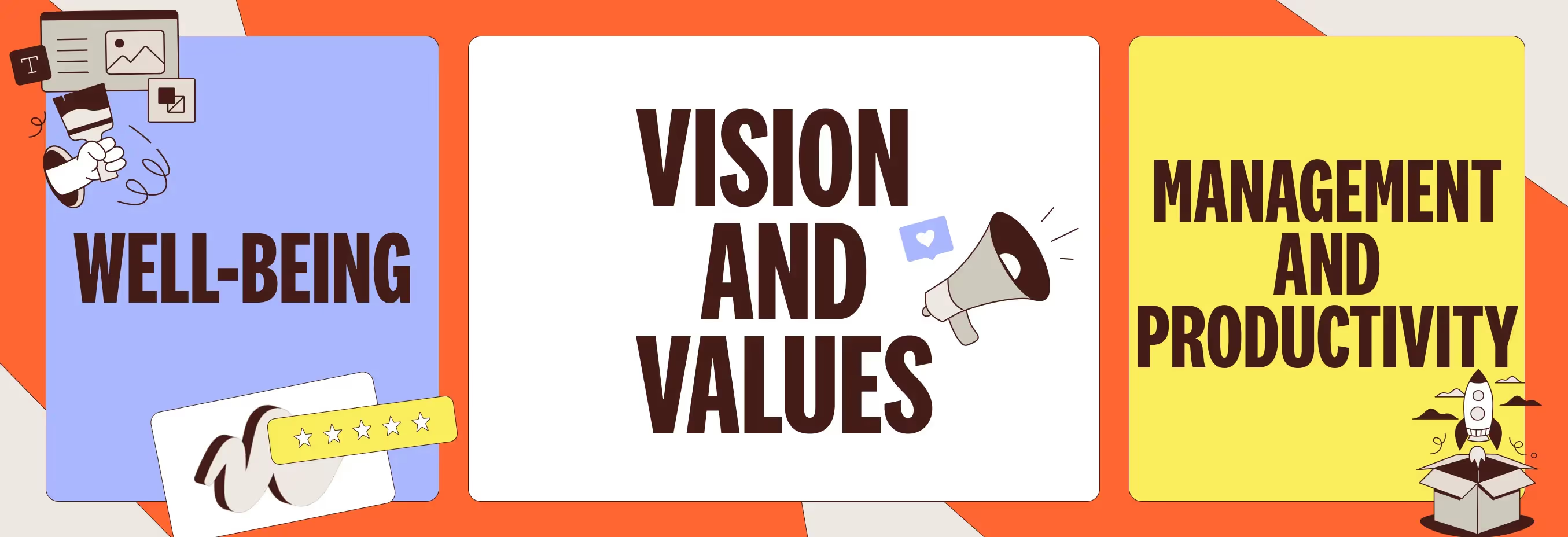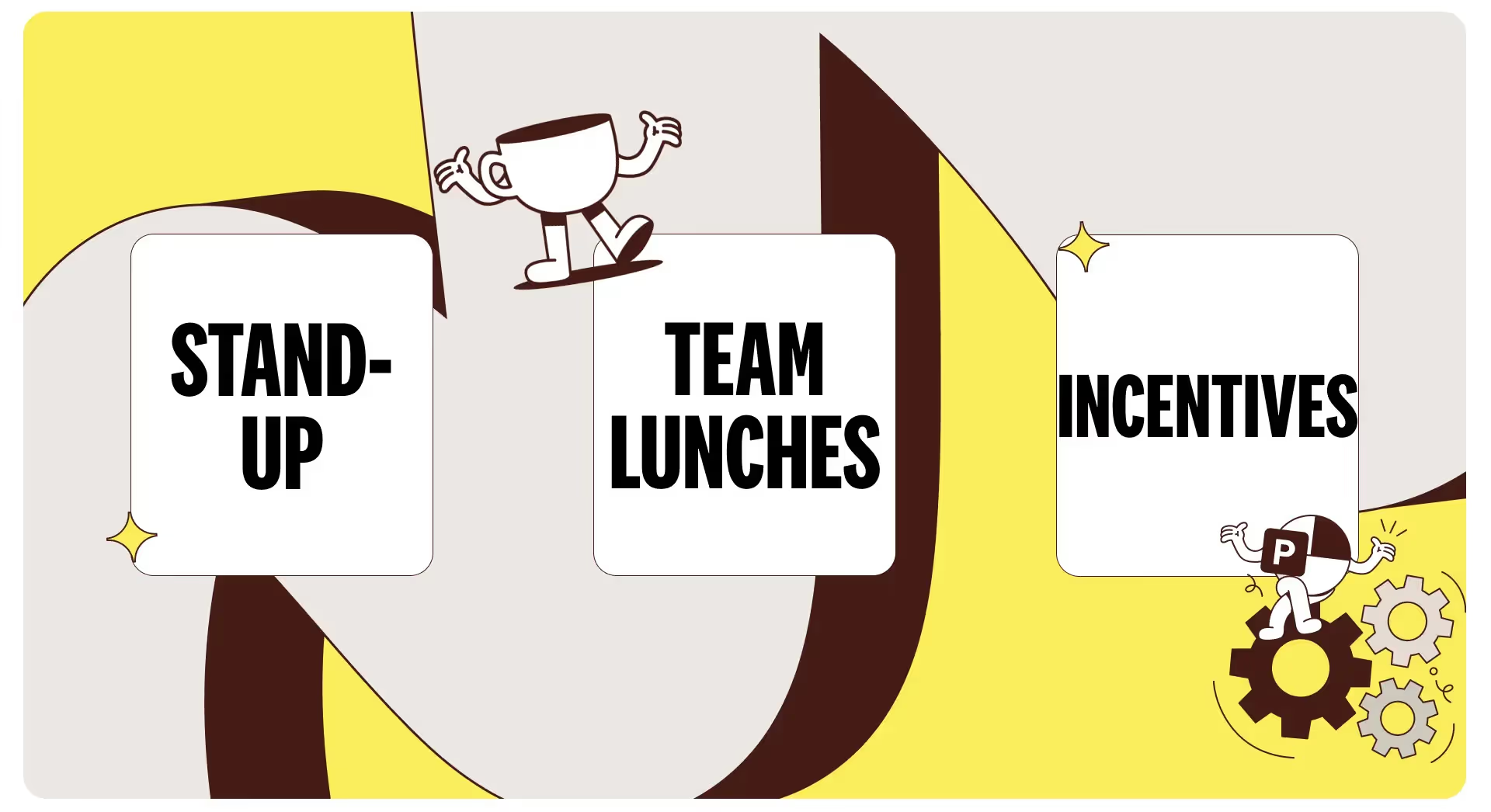Why cultivate a sense of belonging in business?
Learn why you need a sense of belonging to make your business evolve

The Feeling of Belonging in Business: Why and How to Cultivate It
In 2024, there is a lot of talk about productivity mixed with well-being in business, as well as all the ancillary subjects internal to a company. Today, these elements - well-being, work/personal balance, a sense of belonging, etc. - have become key success factors for companies and allow them to progress sustainably and positively. Understanding and strengthening these aspects - and especially the sense of belonging that we are studying today - is essential for creating a positive and productive work environment.
It is a safe bet that not taking this into consideration could greatly harm the expansion of a business and its influence both internally and externally, which is why here we decipher the why and the how of the feeling of belonging.
What is a sense of belonging in business?
The feeling of belonging in business is now a predominant aspect of corporate culture and internal communication, as it must be strengthened at all times to keep a motivated and motivating payroll.
The feeling of belonging is the attachment and recognition that an employee feels towards his employer and his professional structure. It is a connection that is both emotional and professional, a strong commitment, personal satisfaction, and a motivation to contribute to the success of the organization. The feeling of belonging means that the employee identifies with and adheres to the values of the company, and therefore that the employer brand is correctly identified and developed.
A successful employee with a strong sense of belonging proves to be a true ambassador for a brand, ready to engage and motivate others.
Why a sense of belonging is crucial for businesses
Impact on productivity
Obviously, any business must be profitable and must think of its productivity as a first priority if it wants to survive. The good news is that boosting your employees' sense of belonging will have a positive impact on the overall productivity of the company. A strong sense of belonging can significantly improve employee performance, because when employees feel included and valued, they are more motivated to achieve their goals and contribute to the overall success of the business.
In addition, developing a sense of belonging and creating a common feeling promotes teamwork and team spirit, which boosts individual and collective performance. Good cohesion is the guarantee of positive and meaningful management: each employee will go above and beyond to increase production and, thus, not penalize anyone.
Reduction in turnover
Everyone prefers to work in a good atmosphere rather than in a tense atmosphere, right? The feeling of belonging also depends on well-being and the quality of life at work, in a global way.
It is often said that a happy employee is more likely to stay in a company, even at the expense of other elements such as salary. As a result, businesses that cultivate a sense of belonging often succeed in retaining employees. A positive and engaging work environment reduces absenteeism and turnover, which helps to retain talent and improve the stability of the team.
In other words, focusing on group values, mutual support and a sense of pride increases loyalty and therefore reduces turnover.
You know what you need to do in order not to lose your most efficient employees!

Factors that contribute to a sense of belonging
Effective communication
Your internal communication should be twofold: top-down and bottom-up.
The term “communication” comes from Latin to communicate: to share. Thus, it is unthinkable to consider that internal communication is only the responsibility of administrative and strategic actors. Communication must be transversal and collaborative and, above all, must take place for and by the entire company.
Transparency and open communication are therefore essential to build trust and mutual respect. An effective communication flow helps to clarify expectations and maintain a strong connection between employees and management.
Recognition and valorization
Recognizing the work and efforts of employees is fundamental to developing a sense of belonging. Regular rewards and recognition programs contribute to strengthening the commitment of employees. Small actions can be put in place and mean a lot to employees:
Know How to Say Thank You
Simply, give regular thanks, whether written and oral, for small and large tasks, so that each action is valued and makes you want to keep up the momentum.
Money Sometimes Makes You Happy
Bonuses are obviously a good way to keep teams motivated and valued, because all work deserves a salary and someone who does not feel properly recognized because of their remuneration and bonuses could be tempted to seek this financial valuation elsewhere. For the same reason, do not hesitate to increase your employees and to plan a solid and realistic career plan; do not be afraid to increase your employees, because salary is also part of the recognition given to work.
Be Genuinely Interested in Others
Finally, as with the thanks, note the progress made and encourage you to continue on this path. Show that you are interested in the actions taken, that you are interested in each and every gesture. Indeed, by making actions and people invisible, you risk creating rancor, so open your eyes to your employees, cultivate kindness and recognize their value.
To be close as possible to employee considerations, some companies also rely on remote work in order to promote a balance between professional and personal life, and to prevent discouragement and demotivation. Do not hesitate to ask the question directly to your employees to understand their motivations and needs and, thus, to best respond to them.
Development opportunities
On the other hand, providing opportunities for continuing education and professional development allows employees to feel invested in their career path. This demonstrates the company's commitment to the personal and professional growth of its employees. Thus, employees who feel supported in their overall career will be more invested and will seek to give the best of themselves to invest in this knowledge and this learning path.Betting on the career development of an employee is a form of valuation that is not well recognized, but which nevertheless proves its worth, but which nevertheless proves its worth; it is a positive signal to the employee who feels that they are counting on them and that we want to support them in their progress. He then knows that he does not have to fear losing his place and, through a relaxed look at his missions and a new impetus obtained, he will be all the more productive and qualified.

Strengthening corporate culture
If the feeling of belonging reinforces corporate culture by aligning employee values with those of the organization, all that remains is to succeed in putting these precepts into practice. This is perhaps the most difficult part, because while understanding the issue is simple, developing a sense of belonging on a daily basis can be much more difficult.
For everyone to feel involved in a common mission, certain regular adjustments need to be made.
Involving employees
If you act in your own corner, if changes are not announced, if changes come from nowhere, etc., then your employees will quickly lose interest in your company, because they will feel that they have nothing to contribute and that their opinion is useless. Conversely, if you organize regular decision-making meetings in which everyone can be heard, regardless of their position, or if you set up idea boxes (digital or physical) and surveys to decide on the next steps to follow, then they will feel that they are respected and will be even more involved in their position and their service. Internal communication is therefore a significant aspect of creating a healthy and sustainable corporate culture. Involve your employees and they will get involved.
Fostering leadership
As mentioned in the turnover and productivity section, participatory management - and not directive - makes it possible to increase the well-being of employees and their professional performances. Acting as a leader rather than a despot manager makes it possible to boost team cohesion and to take your employees further, more quickly. A leader is a person who will energize a group, who will work with his teams and develop a common feeling of pride and desire, while the traditional manager/manager will delegate without worrying about transversal or external data to the given project. The leader copes with it, while the manager gives things to do, and this has a major influence on the desire to belong to a group, the desire to stay in the workplace and the desire to produce quality work. In short, leadership style is a direct tool that promotes the development of employees.
Set Up Regular Rites
Often overlooked, team rituals promote common social thinking and develop a certain pride in working, by sharing strong values. Emotions are born from common memories and shared experiences, which is why it is important to create them regularly! For this, nothing better than team buildings and other team workshops during which you can build relationships with your employees and during which they can build relationships between them. Thus, collaborative projects reinforce community engagement within the company. These initiatives encourage cooperation and camaraderie, thereby contributing to a positive work environment.
Rituals can therefore be original and unifying moments, such as a teambuilding day, a seminar weekend or afterworks, but also more regular moments that cost less in time and energy, such as Stand-up Every morning to discuss what was done the day before and what remains to be done today, which will intensify the impression of being part of a whole, of serving a common project, of feeling useful to others, and therefore of having to respect deadlines; Team lunches To take the day off and have a good time disconnected from work, allowing you to breathe new life into the afternoon; and organize Incentives And other challenges To bring the game into the work, thus giving additional motivation and increasing recognition for the work done.

Developing diversity and inclusion
Valuing cultural diversity and ideas is key to creating an inclusive sense of belonging. By promoting equality and respecting differences, businesses strengthen commitment and innovation. By developing inclusion and diversity -whether during recruitment processes and job interviews or during the stages of corporate life-, a company thus opens up to the world and sends a positive message to the outside world, which can shine through to future employees or future customers. Because, it is a fact, consumers are now very attentive to working conditions in societies and the positive or negative impact they have on people and the planet. For inclusion to remain total, it is necessary to promote a healthy office or warehouse, because the work environment plays an important role in the perception of employees. The premises must be accessible to people with reduced mobility (in the context of tertiary work, in particular) or the installations must be ergonomic and facilitating. A well-designed and ergonomic workspace improves the comfort, productivity, and sense of belonging of employees, so it's not something to be overlooked.
Measuring the sense of belonging
Polls and Surveys
Doing your best to improve company culture and a sense of belonging is good, but knowing if your efforts are paying off is better. Regular feedback is essential to adapt and improve internal policies. Continuous feedback makes it possible to respond quickly to concerns and strengthen employee engagement. The use of internal surveys makes it possible to assess the commitment and sense of belonging of employees. These tools provide valuable data to identify areas for improvement and test the employee experience. Employee feedback helps to form a solid foundation of understanding teams in order to strive for continuous improvement and, thus, stay on the agenda and understand everyone's needs.
KPIs and indicators
Key performance indicators (KPIs) help track changes in the sense of belonging. They make it possible to measure the impact of initiatives and to guide future strategies. Relevant KPIs include:
- Employee Retention Rate: An important indicator for measuring employee loyalty and the effectiveness of sense of belonging initiatives.
- Employee engagement: Measured through regular surveys, this indicator assesses how connected and motivated employees feel about their work.
- Productivity: Employee productivity levels can reflect their level of satisfaction and sense of belonging.
- Employee feedback: Qualitative feedback obtained through surveys or interviews can offer valuable insights into areas for improvement.
- Absenteeism rate: A low absenteeism rate can indicate a healthy work environment and a strong sense of belonging.
By using these KPIs, businesses can continuously assess and adjust their strategies to strengthen a sense of belonging and improve the work environment.
Challenges and obstacles
The challenges and obstacles of corporate culture are numerous and varied, but three major aspects stand out in particular: the management of internal conflicts, the adaptation to remote work and the resistance to change.
First of all, managing internal conflicts is crucial to maintaining a harmonious work environment. Conflicts can occur for a variety of reasons, such as differences of opinion, misunderstandings, or workload tensions. Without effective management, these conflicts can damage team cohesion and demotivate employees. It is therefore essential to put in place strategies to resolve tensions quickly and maintain a sense of belonging. Mediation tools, non-violent communication training, and empathetic leadership can be particularly useful in this context.
Second, adapting to remote work represents a major challenge, especially in the current context where more and more companies are opting for hybrid or entirely remote working methods. Maintaining a sense of belonging when interactions are primarily online is complex. Businesses need to adopt technologies that facilitate communication and team engagement, such as collaboration platforms and regular virtual meetings. In addition, it is important to create opportunities for informal social interactions, even at a distance, in order to strengthen the bonds between team members.
Finally, resistance to change is a frequent obstacle in improving a sense of belonging. Employees may be reluctant to accept new ways of working, structural changes, or technological innovations. This resistance may be due to a fear of the unknown, a lack of confidence in management, or poor communication of the goals and benefits of change. To overcome this resistance, it is essential to put in place change management strategies, such as training, information sessions, and ongoing feedback processes. Involving employees in the change process and valuing their contributions can also facilitate the transition to a positive corporate culture.
Let's conclude and let's cultivate!
In conclusion, cultivating a sense of belonging within a company is essential to ensure its sustainability and competitiveness. Companies must put in place strategies to strengthen shared values, federate and promote team cohesion and encourage employee engagement. By developing a solid organizational culture and by valuing integrity and honesty, managers can create an environment where employees feel genuinely involved in a common project. This increases productivity and reduces turnover, and also turns employees into motivated and successful ambassadors. In short, a real sense of belonging is a powerful lever for the development and retention of employees, as well as for the sustainable success of the company.
Sourcing :
Ce qu'il faut retenir
- A way to boost productivity and reduce turnover
- It is possible to cultivate a sense of belonging in hundreds of different ways!
- Remember to measure your successes and areas for improvement



